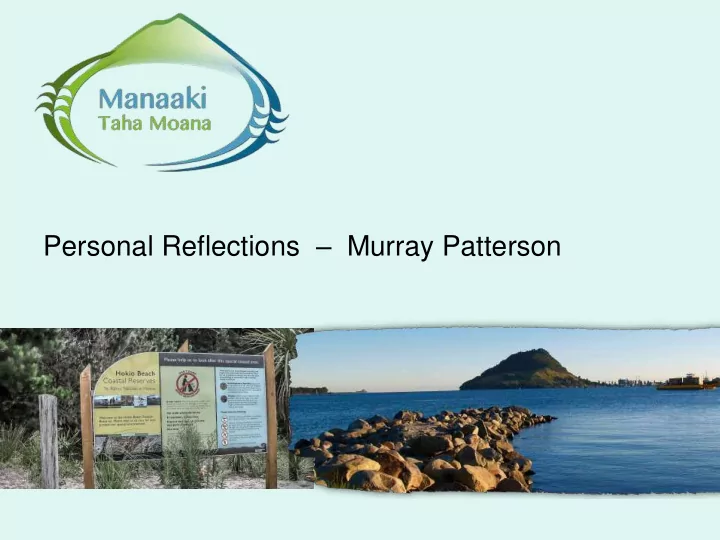

Personal Reflections – Murray Patterson
• Out of my comfort zone • Acknowledgment of Charlotte Šunde and Anthony Cole • In my view, the project ‘worked’ because : - Safe place/s for every-one to research & communicate - Agreed/upon ‘shared’ vision - Agreed upon kaupapa for the research programme - Primarily, led by what iwi/hapu wanted
• Out of my comfort zone • Acknowledgment of Charlotte Šunde and Anthony Cole • In my view, the project ‘worked’ because : - Safe place/s for every-one to research & communicate - Agreed/upon ‘shared’ vision - Agreed upon kaupapa for the research programme - Primarily, led by what iwi/hapu wanted - We had the right people (personality-wise) for cross- cultural research – no prima donnas - Distributed Leadership - Multi-disciplinary, as well as being bi-cultural - Mutli-method to suit the purpose of the problem/issue (every method has its advantages and limitations) - It delivered practical benefits, as well as new knowledge
What Could We Done Better? - Communication was difficult, due to researchers located in: Tauranga, Horowhenua, Palmerston North, - Financing difficult for some iwi/hapu groups - Communication of our research national-wide - Could have done better with capacity building - Few speed wobbles with iwi/hapu governance at the beginning For further written reflections:
Outputs and Outcomes from Manaaki Taha Moana 2010-2014 (for Tauranga Only) In tended Outcomes Assist in Improving the Ecological Health of the • Harbour by generating new Knowledge and Analytical Tools Iwi/hapu Capability Development (co-management) • Ecology of Harbour Cultural Values & Matauranga Modelling & Ecological State of the Health of Harbour • Maori Economics Survey Coastal Cultural Health Index • Board-scale Survey of the Mediated Modelling of • • Matauranga Maori Monograph • Harbour Issues Harbour Shellfish Surveys for • Cumulative Impact Index Preliminary Work on • • Customary Harvest Ecosystem Services Species distributions along • Prototype Spatial- sediment, nutrient, contaminant • gradients Dynamic Model Multivariate analysis of • biological & chemical endpoints Other Journal Articles Cross-Cultural Dialogue • Information Technology Cross-cultural Environmental • 3 Dimensional Table • Research Framework Kapawai (Drone) Imagining • Cross-Cultural Approach to • Digital Library • Economics Culture Matters too • Publications Count (all three published 25 Published Monographs • internationally) 10 Journal Articles • Regional Economics 5 Book Chapters • Input-Output Model of the • Numerous Conference Papers • Tauranga Economy Book on Manaaki Taha Moana • Major Publication on Tauranga (planned with international • Policy/Governance Economy publisher) 2 journal articles of coastal • governance Our Website: http://www.mtm.ac.nz/
tino rangatiratanga (self-determination) – participants control their own cultural aspirations and destiny; reciprocity of knowledge transfer to empower and build capacity; appropriate protocols are implemented regarding information security; tikanga/kawa (conduct) – respect the cultural significance of traditional customs and act accordingly within the research programme; taonga tuku iho (cultural aspiration) – Māori ways of knowing, doing and understanding are unique and valid in their own right, and this is recognized within the research programme. kotahitanga (collaboration) – while the unique contribution of each individual person, whānau , Hapū and Iwi are recognized, collective cooperation can empower and improve social, cultural and economic capacities. Thus, we work towards the holistic wellbeing of the collective; whanaungatanga (building relationships) – building and enhancing strong relationships to enable effective co- operation, based on respect, understanding and aroha (affection, sympathy, charity, compassion, love, empathy); ata (respect) – building and nurturing relationships, by behaving in appropriate ways when interacting with people, kaupapa (matter for discussion, subject, programme) and environments to uphold mana (integrity). It assumes appropriate pre-planning in order to be properly prepared, and humility; manaakitanga/kaitiakitanga (care and guardianship) – building strong relationships, caring for and protecting things of importance (such as knowledge) for the present and future generations; maramatanga (understanding) – transparency of conduct at all levels, with management guidelines regarding planning, communication, policies and procedures.
Recommend
More recommend